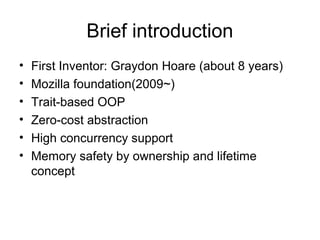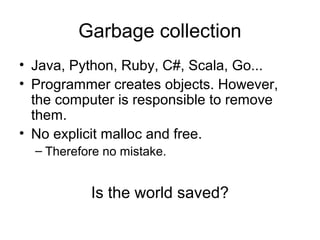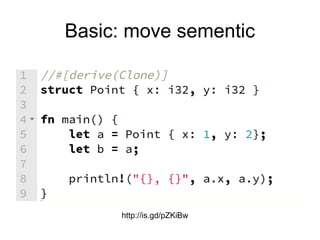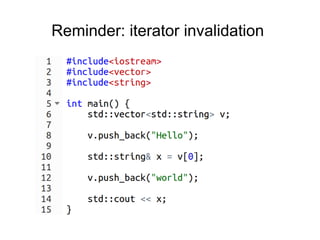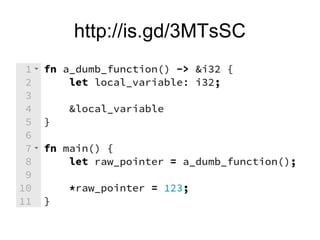Rust Programming Language
- 2. Brief introduction • First Inventor: Graydon Hoare (about 8 years) • Mozilla foundation(2009~) • Trait-based OOP • Zero-cost abstraction • High concurrency support • Memory safety by ownership and lifetime concept
- 3. Problem: Memory Safety • Use-after-free (dangling pointer) • Double free • Null pointer dereference These kind of problems cause not only software crash, but also security vulnerabilities.
- 4. Use-after free Simple and trivial case
- 5. Dangling pointer & Local variable is allocated in stack, a temporal storage of function. If you return a reference of local variable, the address will be invalidated. If these two functions are far away from each other, this kind of bugs can be very hard to find.
- 6. Hard case: Iterator invalidation Can you see the problem?
- 7. Even a famous library may betray you If you do not know much about the internals...
- 8. Garbage collection • Java, Python, Ruby, C#, Scala, Go... • Programmer creates objects. However, the computer is responsible to remove them. • No explicit malloc and free. – Therefore no mistake. Is the world saved?
- 9. The real life is not that easy... • Computer cannot know the exact timing that each object should be freed. – tracing GC:GC engine should track all objects periodically. – reference counting: every object has a counter; the number of pointers referencing itself. • Both ways need more memory and CPU power.
- 10. Garbage Collection • No predictability – cannot used for real-time system • Limited concurrency – global interpreter lock • Larger code size – VM(or GC) must included
- 11. System program • Must be FAST. • Must has runtime overhead as little as possible. • Must be memory SAFE. • Should be possible to direct memory access. • GC cannot be used in such area!
- 12. Rust programming language • Zero-cost abstraction • Memory safety without garbage collection • Super fast code generation • C function compatibility (extern "C") • Simpler syntax than C++
- 15. Benchmark • http://benchmarksgame.alioth.debian.org/ u64q/rust.html • Program written in Rust is as fast as that of C!
- 17. Case study: Servo • Mozilla's next-gen web browser engine • Written in Rust • Parallel layout, rendering, ... almost everything • "During the 2 years of development, we have never experienced any memory- related bugs like use-after-free or double free." - an engineer from Mozilla
- 20. The ownership magic v is an owner of the vector x borrows the vector from v now v cannot modify the vector because it lent the ownership to x
- 21. remember this? &
- 23. Lifetime borrowed pointer cannot outlives the owner!!
- 24. Borrowing rules • You cannot borrow mutable reference from immutable object • You can borrow immutable reference many times • You cannot borrow more than one mutable reference • There cannot exist a mutable reference and an immutable one simultaneously • The lifetime of a borrowed reference should be ended before the owner object do

